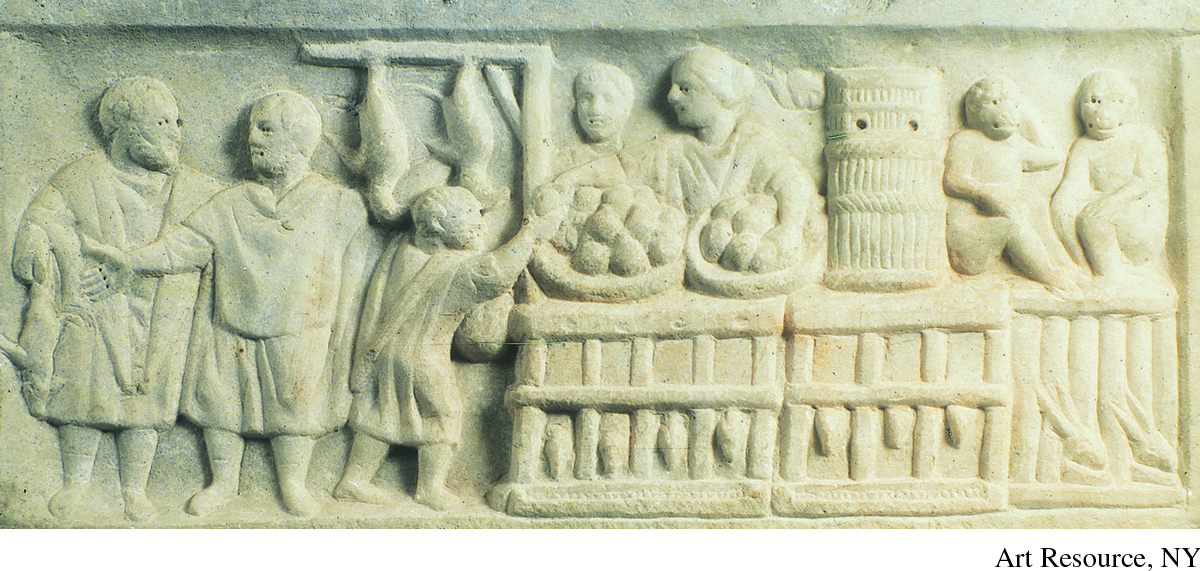The Roman Family
The Roman Family
The family was Roman society’s bedrock because it taught values and determined the ownership of property. Men and women shared the duty of teaching their children values, though by law the father possessed the patria potestas (“father’s power”) over his children—no matter how old—and his slaves. This power made him the sole owner of all his dependents’ property. As long as he was alive, no son or daughter could officially own anything, accumulate money, or possess any independent legal standing. Unofficially, however, adult children did control personal property and money, and favored slaves could build up savings. Fathers also held legal power of life and death over these members of their households, but they rarely exercised this power except through exposure of newborns, an accepted practice to limit family size and dispose of physically imperfect infants.
Patria potestas did not allow a husband to control his wife; instead, under the common arrangement called a “free” marriage, the wife formally remained under her father’s power as long as the father lived. But in the ancient world, few fathers lived long enough to oversee the lives of their married daughters or sons; four out of five parents died before their children reached age thirty. A Roman woman without a living father was relatively independent. Legally she needed a male guardian to conduct her business, but guardianship was largely an empty formality by the first century B.C.E. As a commentator explained, “The common belief seems more false than true that, because of their instability of judgment, women are often deceived and that therefore it is only fair to have them controlled by the authority of guardians. In fact, women of full age manage their affairs themselves.”

A Roman woman had to grow up fast. Tullia (c. 79–45 B.C.E.), daughter of Rome’s most famous politician and orator, Cicero, was engaged at twelve, married at sixteen, and widowed by twenty-two. Like every other wealthy married Roman woman, she managed the household slaves, monitored the nurturing of the young children by wet nurses, kept account books to track the property she personally owned, and accompanied her husband to dinner parties—something a Greek wife never did.
A mother’s responsibility for shaping her children’s values constituted the foundation of female virtue. Women like Cornelia, a famous aristocrat of the second century B.C.E., won enormous respect for loyalty to family. When her husband died, Cornelia refused an offer of marriage from King Ptolemy VIII of Egypt so that she could continue to oversee the family estate and educate her surviving daughter and two sons. (Her other nine children had died.) The boys, Tiberius and Gaius Gracchus, grew up to be among the most influential political leaders in the late republic. The number of children Cornelia bore reveals the fertility and stamina required of a Roman wife to ensure the survival of her husband’s family line. Cornelia also became famous for her stylishly worded letters, which were still being read a century later.
Roman women could not vote or hold political office, but wealthy women like Cornelia influenced politics by expressing their opinions to men at home and at dinner parties. Marcus Porcius Cato (234–149 B.C.E.), a famous politician and author, described this clout: “All mankind rule their wives, we [Roman men] rule all mankind, and our wives rule us.”
Women could acquire property through inheritance and entrepreneurship. Archaeological discoveries reveal that by the end of the republic some women owned large businesses. Prenuptial agreements determining the property rights of husband and wife were common. In divorce fathers kept the children. Most poor women worked as field laborers or in shops. Women and men both worked in manufacturing, which mostly happened in the home. The men worked the raw materials—cutting, fitting, and polishing wood, leather, and metal—while the women sold the finished goods. The poorest women earned money through prostitution, which was legal but considered disgraceful.